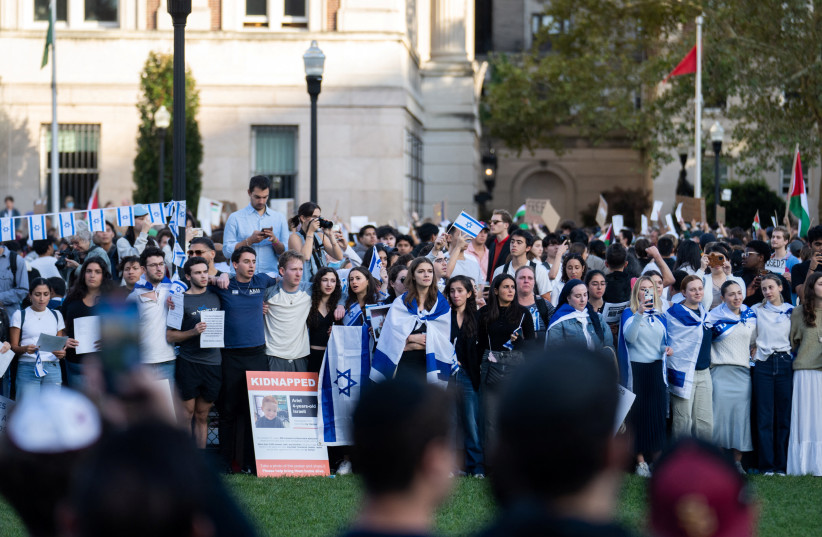When Columbia University suspended its chapters of Students for Justice in Palestine and Jewish Voice for Peace in November, it said they could be reinstated in the spring semester if they show “a commitment to compliance with University policies.”
The new semester began on Tuesday. But the two pro-Palestinian groups remain suspended, the New York Jewish Week has learned.
A university official said the groups have not yet agreed to adhere to university rules that would allow their reinstatement. The official said administration staff had met with representatives from the groups to discuss steps toward ending the suspension.
“The groups would have to agree to fully comply with the university’s long-standing policies and procedures” to regain their recognition, the official told the New York Jewish Week. “If the groups agree to follow these prescribed steps and fully comply with university rules that apply to all student groups, they may be reinstated.”
The official added, “At present, they have not yet committed to doing so and remain suspended.”

Groups cannot receive university funds, hold authorized events on campus
The suspensions mean the groups cannot receive university funding or hold authorized events on campus.
The student groups did not respond to requests for comment. In a post Wednesday on X, formerly Twitter, Columbia SJP accused the university of “attempting to intimidate and harass Palestinian students from speaking out about genocide.”
“The more you try to silence us, the louder we will be,” the group said.
The two clubs were suspended as pro-Palestinian and anti-Israel activities roiled the campus and universities nationwide, following the Oct. 7 Hamas attack on Israel and the subsequent war in Gaza. Their suspension marked a significant crackdown on two of Columbia’s most outspoken pro-Palestinian student groups. The university said the two clubs had violated university policies and expressed “threatening rhetoric and intimidation.”
Ahead of the suspension, the two groups held a series of protests and other actions calling for a ceasefire in Israel’s war against Hamas and accusing Israel of “genocide.” Other protests included a “die-in” in front of the school’s Low Library and a demand that Columbia end its dual degree program with Tel Aviv University. SJP also promoted a nine-hour sit-in at the Columbia School of Social Work in violation of school rules.
Columbia’s senior executive vice president and chair of its Special Committee on Campus Safety, Gerald Rosberg, said in November that the decision to suspend the clubs “was made after the two groups repeatedly violated University policies related to holding campus events.”
The final decision came after the groups held a rally “that proceeded despite warnings and included threatening rhetoric and intimidation,” Rosberg said in a statement.
In response, the two groups said, “You can shut our organizations down, but can’t stop our hearts from beating for liberation, humanity and the freedom of Palestine.”
On Wednesday, a university spokesperson, Samantha Slater, told the New York Jewish Week that the administration hopes “to get the non-complying groups back to working with their official advisers and in compliance with university policy to help keep our campus safe for all.”
Columbia was in the news after Oct 7, less so after hearing debacle
Columbia was a focal point for controversy in the weeks after Oct. 7, amid dueling protests for and against Israel and the reported assault of an Israeli student. But the campus has received less attention since the presidents of three other elite universities — Harvard University, the University of Pennsylvania and the Massachusetts Institute of Technology — gave testimony to Congress last month that the drew the ire of Jewish an other critics. Those university presidents told lawmakers that calling for the genocide of Jews did not necessarily violate university policy, provoking a firestorm of controversy that preceded Penn’s and Harvard’s presidents stepping down.
Columbia’s president, Minouche Shafik, was invited to appear before Congress at the same hearing, but declined, citing a scheduling conflict. Shafik attended a United Nations climate change conference in Dubai that day.
SJP, whose national umbrella celebrated Hamas’ Oct. 7 onslaught against Israel, has been suspended at several schools, including Florida’s public universities, George Washington University and Brandeis University. Columbia’s suspension of JVP appeared to be the first time a university suspended the Jewish anti-Zionist group.
Rutgers University in New Jersey, meanwhile, has reinstated its SJP chapter and put it on a one-year probation, according to the Bergen Record.
